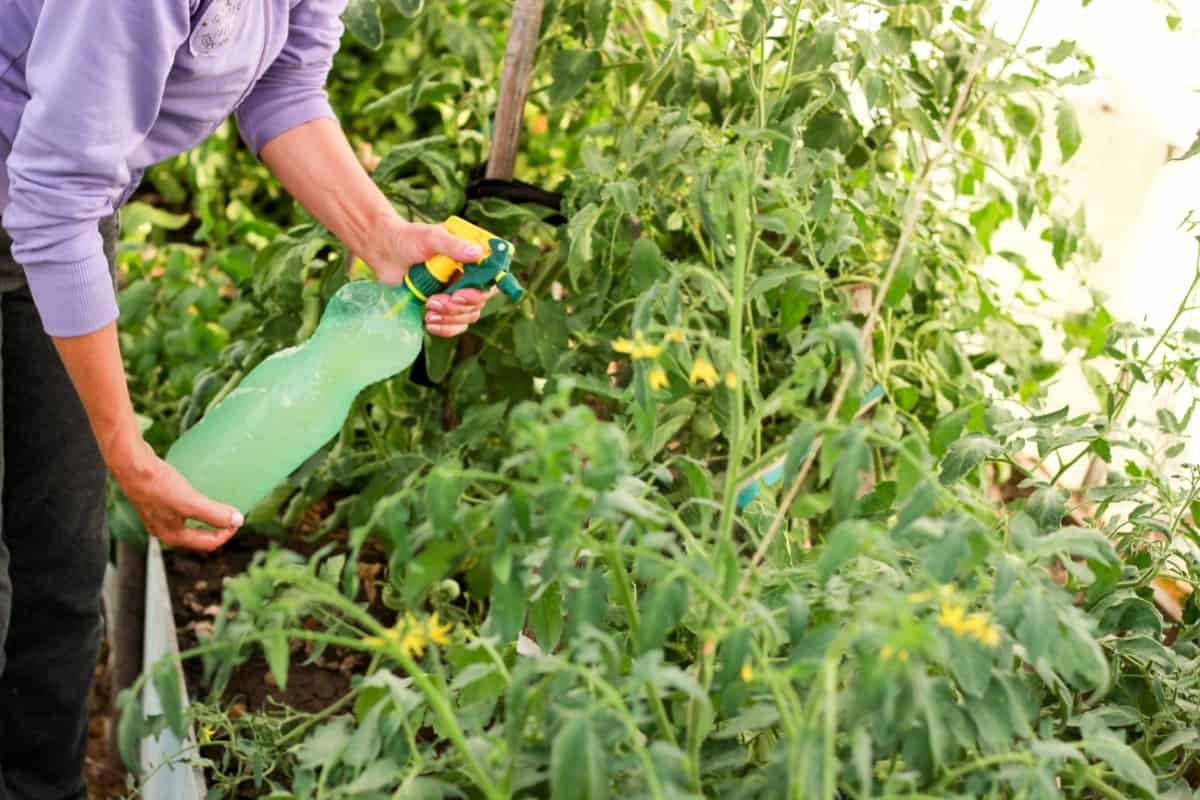Are pesky garden pests wreaking havoc on your beloved plants? Don’t fret! In this article, we’ll guide you through creating and utilizing an incredible organic pesticide called Brahmasthra. Say no to harmful chemicals and hello to a safer, more sustainable approach to pest control.

Brahmasthra is a potent organic pesticide that effectively tackles garden pests and promotes a healthy ecosystem in your garden. This easy-to-follow guide will provide step-by-step instructions on making Brahmasthra using natural ingredients in your pantry. Plus, we’ll share invaluable tips on properly applying it to your plants for maximum effectiveness.
How to Make and Use Brahmasthra Organic Pesticide
What is Brahmasthra?
Brahmastra is a powerful natural pesticide that effectively combats a wide range of large and small garden pests. This incredible liquid mixture is a reliable defense against pests like borers, pod borers, and fruit borers, which can cause significant damage to your garden plants. The best part is that farmers can effortlessly prepare this Brahmastra pesticide at home, using easily available ingredients. With its simple yet effective formulation, Brahmastra provides a sustainable and eco-friendly solution for pest control, allowing farmers to protect their crops without relying on harmful synthetic pesticides.
Importance of Organic Pest Control
Organic pest control is gaining widespread recognition for its crucial role in promoting a healthy and sustainable approach to gardening and agriculture. By adopting organic pest control methods, we can create a safer and more sustainable environment, protect our health, and ensure the availability of healthy produce for generations to come.
- Environmental Safety: Organic pest control methods prioritize using natural ingredients, minimizing the harmful impact on the environment. Unlike synthetic pesticides, organic alternatives don’t leave toxic residues that can contaminate soil and water or harm beneficial organisms like bees and butterflies.
- Healthier Food: By employing organic pest control, we ensure that the fruits, vegetables, and herbs we consume are free from harmful chemical residues. This contributes to a healthier diet and reduces the risk of health issues associated with pesticide exposure.
- Preserving Biodiversity: Organic pest control methods encourage a balanced ecosystem by preserving beneficial insects, birds, and other natural predators. This helps maintain biodiversity and promotes a sustainable environment.
- Long-Term Effectiveness: While synthetic pesticides may provide short-term solutions, pests can develop resistance over time. On the other hand, organic pest control methods focus on integrated approaches that target the root causes of pest infestations, ensuring long-term effectiveness.
- Sustainable Agriculture: Organic pest control aligns with the principles of sustainable agriculture, promoting practices that are in harmony with nature, minimizing soil degradation, and fostering resilient ecosystems.
Benefits of Using Bramastra Organic Pesticide
- Effective against various garden pests, including borers, pod borers, and fruit borers.
- Made from natural ingredients, reducing the risk of toxic residues on plants and the environment.
- Protecting beneficial insects, birds, and natural predators supports a healthy ecosystem.
- Promotes sustainable agriculture by minimizing the use of synthetic pesticides.
- Safe for humans, pets, and beneficial organisms like bees and butterflies.
- Provides a natural and eco-friendly alternative to chemical-based pest control methods.
- Does not harm soil health or contaminate water sources.
- Helps maintain biodiversity by preserving natural habitats and wildlife.
- Reduces the risk of pesticide resistance in pests over time.
- Enhances the quality and safety of garden produce by minimizing chemical exposure.
- Allows for organic gardening practices, aligning with sustainable and healthy living principles.
- Easy to make at home using readily available ingredients.
- Cost-effective compared to purchasing commercial pesticides.
- It can be customized and adjusted for specific plant types and pest issues.
- Offers peace of mind by promoting a natural and responsible approach to pest management.
How Bramastra Works Against Garden Pests
- Disruption of Pests’ Nervous System: Bramastra contains natural compounds that interfere with the nervous system of pests, leading to paralysis and eventual elimination.
- Anti-Feeding Properties: The ingredients in Bramastra act as repellents, deterring pests from feeding on plants. This helps protect the foliage, flowers, and fruits from damage.
- Insect Growth Regulation: Bramastra disrupts the growth and development of pests, preventing them from reaching maturity and reproducing. This helps to control their population over time.
- Broad Spectrum Effectiveness: Bramastra targets various garden pests, including borers, pod borers, and fruit borers. It offers comprehensive protection against various insects that can cause significant harm to plants.
- Mode of Application: Bramastra can be applied as a foliar spray or sprinkled directly on infected plants. The mixture is diluted with water for optimal coverage and effectiveness.
It is worth noting that the preparation time for Bramastra is approximately 48 hours, allowing the ingredients to ferment and potentiate their pesticidal properties.
In case you missed it: The Role and Importance of Organic Pesticides in Sustainable Agriculture: A Comprehensive Guide

Materials Required for Brahmastra Making
- Cow urine
- Neem leaves (crushed with a thin stem) or neem seed powder (100 grams per acre of cow urine)
- Karanj leaves (crushed) – 100 grams per liter of cow urine
- Custard apple leaves (crushed) – 100 grams per liter of cow urine
- Castor leaves (crushed) – 100 grams per liter of cow urine
- Dhatura leaves (crushed) – 100 grams per liter of cow urine
These ingredients are essential for preparing the potent mixture of Brahmastra, which harnesses the natural properties of these plant materials combined with cow urine to create an effective organic pesticide.
Making Bramastra Organic Pesticide
- Step 1: Mix all the required ingredients in a plastic or cement tank. Stir the mixture using a wooden stick, rotating it clockwise to infuse positive energy.
- Step 2: Boil the mixture on a fire.
- Step 3: Cover the tank with a jute sack or poly net to protect it from direct sunlight and rainwater. Place the tank in a shaded area.
- Step 4: Twice a day, for 1 minute each time, stir the mixture by rotating the wooden stick clockwise.
- Step 5: After 48 hours, filter the Bramastra mixture to separate any solid residues. Transfer the resulting natural pesticide mixture into bottles and store them carefully.
It’s important to note that during the preparation process, maintaining a clean and hygienic environment is crucial. Ensure that the containers and utensils used are free from any chemical residues. These steps will allow you to successfully create Bramastra, a potent organic pesticide for protecting your garden plants.
Applying Bramastra to Your Garden and Field Plants
Once prepared, Bramastra can be stored for up to 6 months, ensuring its availability throughout the gardening season. For garden plants, Dilute prepared Bramastra and sprinkle or use a foliar spray to apply the mixture evenly on the garden plants, targeting the infected areas.
In case you missed it: How to Make and Use Cow Dung-Urine Pesticide

A recommended application for a 1-acre agriculture land farm is using 6 to 8 liters of Bramastra mixture with 200 liters of water. This mixture can be evenly sprinkled on the plants or applied as a foliar spray to cover the foliage. When dealing with severe infestations, a higher concentration of 3% to 4% Bramastra mixture with water can be used for effective control.
Conclusion
By learning how to make and use Brahmasthra organic pesticide, you can effectively protect your garden plants from pests in a safe and environmentally-friendly manner. Embrace this natural solution and enjoy a thriving, pest-free garden.
- Ultimate Guide to Ossabaw Island Hog: Breeding, Raising, Diet, and Care
- Ultimate Guide to Juliana Pig: Raising Facts, Size, Diet, Care, and Lifespan
- Raising Lleyn Sheep: Disadvantages, Price, Uses, Characteristics, and Care
- Ultimate Guide to Meishan Pig: Breed Facts, Breeding, Raising, and Care
- Ultimate Guide to Teacup Pigs: Raising, Diet, Lifespan, Cost, and Care
- Guide to Raising Poll Dorset Sheep: Facts, Profile, Characteristics, Uses, and Care
- Ultimate Guide to Bighorn Sheep: Characteristics, Diet, Lifespan, Breeding, and Lifecycle
- Ultimate Guide to Raising Katahdin Sheep: Farming Facts, Breed Profile, Uses, and Care
- Ultimate Guide to Raising Oreo Cows: Belted Galloways Farming Facts, Profile, Uses, and Care